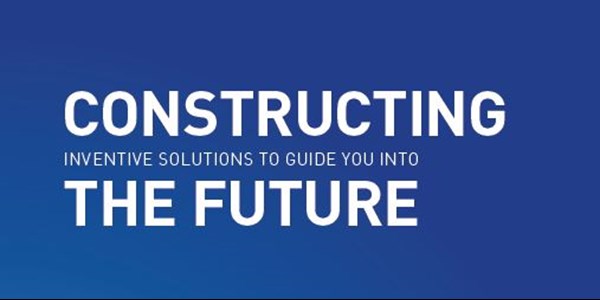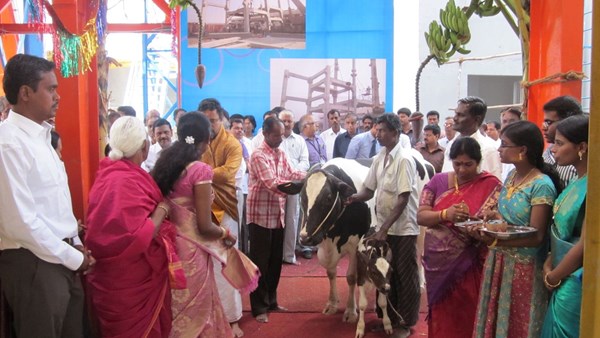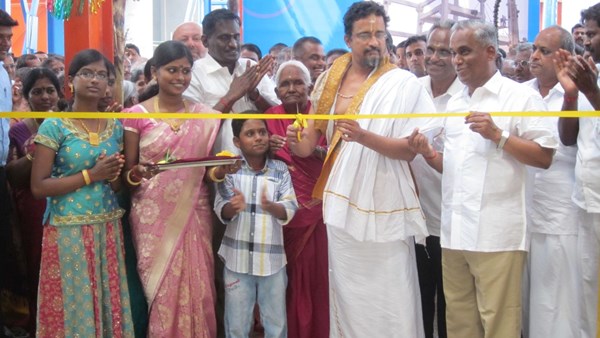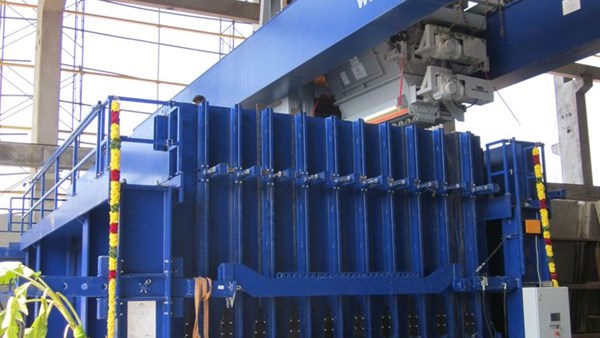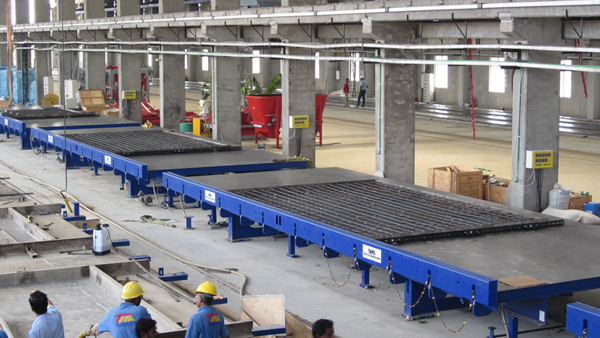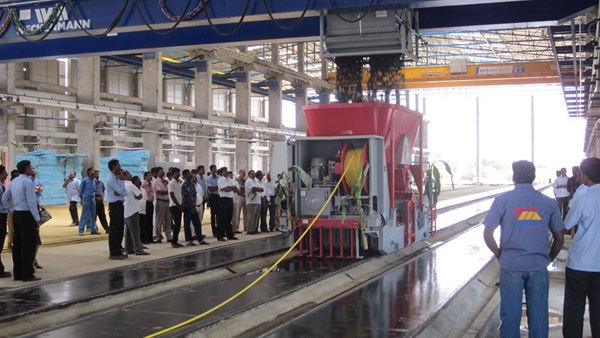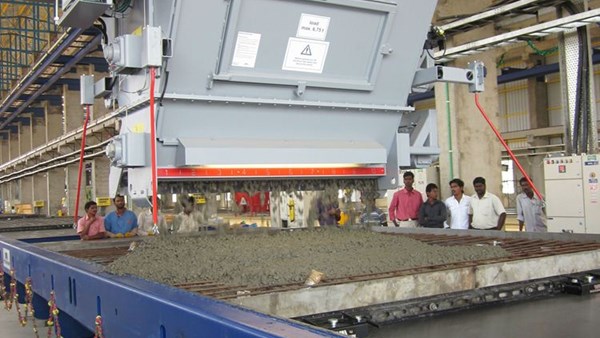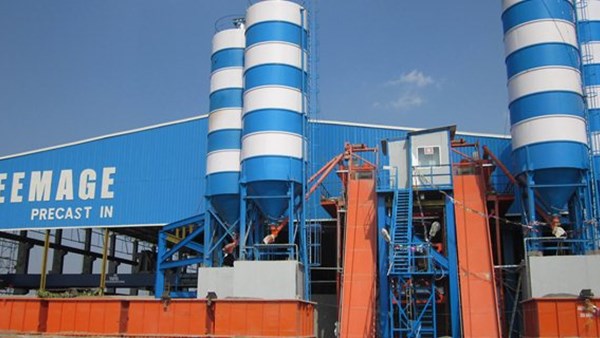Coimbatore, India , 6/25/2012
South Indian textile company The Chennai Silks (TCS) enters the precast industry.
In March 2011 the progressively aligned company, which is also involved in the field of alternative energies, decided to enter the precast industry under the company name Teemage Precast In. The reasons for this decision were numerous, as Managing Director N.K. Nandhagopal explains: "First of all there are our own showrooms; TCS is planning a continuous expansion of the branch network in the federal state of Tamil Nadu, which has 80 million inhabitants. Instead of relying on cast in situ constructions as in the past, the company intends to build its fashion shops and shopping centres in future using precast concrete elements from its own production; that is faster and allows better quality control. We will offer capacities that exceed our own requirements on the free market as general contractors. We see great potential for growth in particular in the fields of social housing construction as well as the construction of commercial and public buildings. However, there is also a large backlog in industrial construction. Apart from shortening the construction period, building with precast elements offers architectural possibilities that have hardly been exhausted to date."
The decision to enter the precast industry was preceded by numerous works inspections and informative discussions in Europe, Russia and in The Middle East. A particular challenge for the company was the fact that at that time there was virtually no other existing and actively producing precast plant anywhere in India whose experience could be taken as a basis. Although TCS had already produced some insulated wall panels using extruded polystyrene in the past, the young team led by the experienced Director Nandhagopal was forced at first to analyse internationally established product ranges and manufacturing concepts and to evaluate their suitability for the Indian market. With regard to the product range and construction system, the company ultimately decided to manufacture floor components in the form of hollow core slabs as well as solid interior and exterior walls - a way that has subsequently been chosen by most other Indian beginners in the precast industry. Due to the cost structure and the general requirement profile in India, the decision was made to omit wall insulation at first. In the coming years the market will decide whether walls with insulation will also be produced in the form of sandwich elements or using lightweight concrete.
The question of the most suitable manufacturing concept for wall production was no less difficult to answer: "Following intensive studies we were faced with a decision between a circulation plant or so-called stationary manufacturing, consisting of a combination of tilting tables for diverse wall elements, stairs and columns as well as a battery molds for the manufacture of interior walls and boundary walls", says Nandhagopal, summarising the decisionmaking process. "The absolute priority for us was a production concept that would allow effective production with a relatively limited investment sum while at the same time enabling gradual growth in the case of positive business development. Also, we quickly became aware that, in addition to the manufacturing technology itself, the personnel component should not be forgotten: in India there are hardly any qualified personnel for the operation of a precast plant, either at operational level or in management. In The Middle East we noticed that circulation plants can be very well suited to the industrial production of precast elements, but they require high initial investment and, due to the complexity of the work sequences, do not produce optimally due to the frequent lack of qualification of the personnel. Hence we decided to enter the Indian precast industry via stationary manufacturing. The work processes are simpler and the individual machines can be operated independently of one another. Depending on development we can then consider expansion in future and adapt production capacities accordingly."
State of the art planning and German-made machines for the market entry
The overall concept of the precast plant on the approx. 65,000 m² site was entrusted to the German machine and plant manufacturer Weckenmann Anlagentechnik GmbH & Co. KG, which subdivided the two-aisle production area into two main areas - floor production and wall production. The concrete produced by the mixing plant (total capacity 90 m³/h), which is equipped with two 1.5 m3 mixers and can be used to manufacture ready-mixed concrete if necessary, is transported to the respective production area by two independently operating Weckenmann bucket conveyor systems, which can automatically drive to the desired transfer point in the production building and can also mutually supplement each other if need be. "Apart from professional planning by an experienced company, the quality of the equipment was of particular importance to us, because we want to manufacture highquality precast elements with outstanding surfaces; in addition to that, we think on a long-term basis", Hariharasudhan stresses during a tour of the Weckenmann wall production plant. Since the future product requirements for the Indian market are difficult to predict, Teemage Precast In demanded that the manufacturing machines exhibit a high degree of flexibility.
Wall manufacturing
A Weckenmann battery mold with 10 compartments enables the production of solid walls with a wall thickness of between 100 and 200 mm as well as a max. height of 3.6 m and a max. length of 7 m, wherein the height of the elements produced in the battery mold is flexibly adjustable. Integrated heating pipes, which can be supplied with hot water or thermal oil, guarantee the fastest possible hardening process, which under ideal conditions also permits 2-shift operation and thus the doubling of production. State of the art vibration technology inside the mold enables a betterthanaverage compaction process, so that the formation of bubbles and incoherent compaction can be avoided even with more demanding concrete mixtures. A unique feature of the Weckenmann battery mold is that it can be filled continuously from the bottom upwards and not in layers as is normally the case.
Like the battery mold, the company's four tilting tables with the dimensions 4.5 m x 12.5 m are also made of highly precise one-piece steel plates and, supported by modern, individually controllable vibration technology, they guarantee the manufacture of optimum fair-faced concrete surfaces. An infinitely adjustable steel edge formwork allows the manufacture of concrete elements in the range of 100 - 250mm. In order to obtain outstanding surface qualities on the tilting tables also, Teemage Precast In additionally decided to purchase a power trowel with a portal design. In pouring the concrete the challenge lay among others in the management of the different filling heights as well as the necessary method of delivery of the concrete. Therefore, the pouring of the concrete into the battery mold with pinpoint precision at a height of approx. 4 m and the laminar distribution of the concrete on the tilting tables with a delivery height of approx. 130 - 150cm were both solved by a concrete distributor with integrated lifting gear. This not only permits freely controllable vertical adaptation to the respective working height with the aid of a remote control; the integrated slidegate valve system in combination with a spiked roller drive additionally allows flexible concrete delivery width, so that recesses as well as window and door openings no longer represent a problem. In addition, delivery on the basis of the spiked roller drive requires much less maintenance and is cheaper than other delivery systems. The initial total wall production capacity is presently around 350 m² in single-shift operation. In 2-shift operation production can be increased by about 200 m² by doubling the use of the battery mold following some induction training, so that a total capacity of approx. 550 m² becomes possible. On top of that it is already intended to expand the battery mold by a further 10 compartments (1-shift 200 m² / 2-shift 400 m²), and the existing production building measuring 175 m in length by 24 m in width can be simply extended by further manufacturing capacities if necessary.
Floor production
The company manufactures floors using a slipformer fed by the Weckenmann bucket conveyor as well as an automatic Weckenmann concrete shuttle. At present approx. 450m² of hollow core slabs can be produced per shift on the three existing production lines, each with a length of approx. 150 m. The floor production area offers possibilities for a future expansion to a total of 9 lines, with a daily total capacity of up to approx. 1,500m².
Lively interest in construction with precast elements
The official inauguration ceremony of the precast plant by the internationally wellknown Hindu priest Sri Muralidhar Swamiji met with lively interest on the part of the construction industry and public bodies in Coimbatore and the surrounding area, as well as the media of the entire federal state of Tamil Nadu.
On 16 February this year more than 300 invited guests came to the celebrations, including Member of Legis lative Assembly and the District Collector, the responsible director for rural development and the first customer, a local building contractor to whom approx. 1,200m² of precast elements are to be supplied by May 2012 for a nearby shopping centre; the customer decided for the first time ever to build using precast elements in order to realise the shortest possible construction time without rework on the building site re quiring considerable use of personnel. For industrial construction too there is already a first order from the renowned local company Janatics. Managing Direc tor N.K. Nandhagopal summarised the successful production start: "In the first month after our official opening we received more than 50 concrete enquiries."
Due to the large demand from other regions of Tamil Nadu also, Teemage Precast In is considering extending the originally conceived delivery radius of approx. 250 km up to 400 km. Hence Chennai, the state capital of Tamil Nadu, would also be in the sights of the newcomer on the Indian precast element market, which presently has 100 employees.

